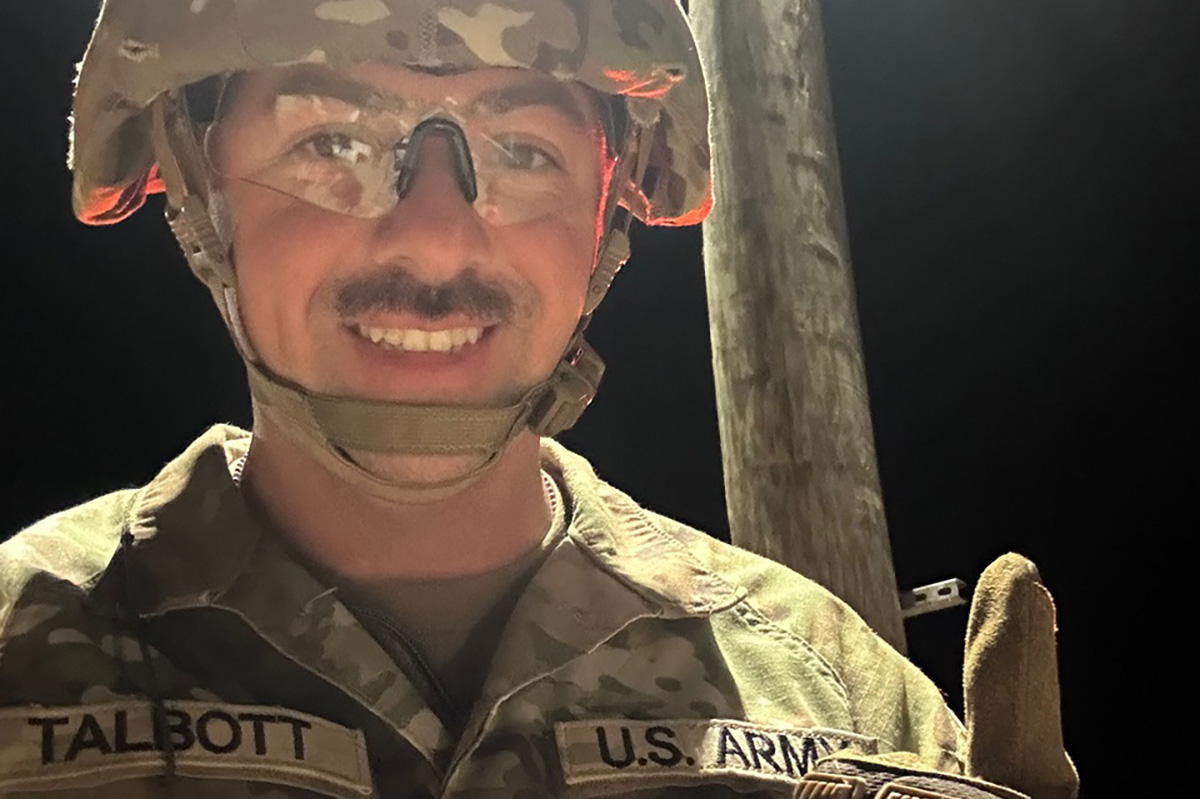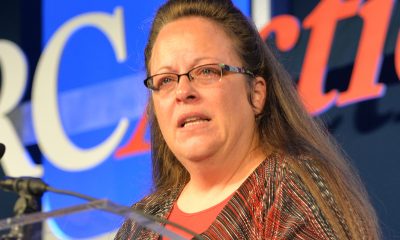National
Election results bolster state marriage fights
Rhode Island, other states expected to debate issue in 2013


Polls show President Obama’s same-sex marriage support did not hurt him among voters. (Washington Blade photo by Michael Key)
Same-sex marriage advocates contend the Nov. 6 election results have given them additional momentum to fight for nuptials for gays and lesbians in their respective states.
Ray Sullivan, campaign manager of Marriage Equality Rhode Island, the group fighting for marriage rights for same-sex couples there, noted to the Washington Blade in a post-Election Day interview the General Assembly will have “more pro-equality legislators seated than ever in history” in 2013.
Gay House Speaker Gordon Fox, who sparked controversy in 2011 when he endorsed a civil unions bill because of a lack of support in his chamber for a marriage measure, has pledged to call a vote on a proposal that would allow nuptials for gays and lesbians in the state before the end of January. The Rhode Island chapter of the American Civil Liberties Union noted in May only 52 couples had obtained civil union licenses since the state’s civil union took effect in July 2011.
Gov. Lincoln Chafee signed an executive order earlier this year mandating state agencies to recognize same-sex marriages legally performed in neighboring Massachusetts, Connecticut and other states. He has also publicly backed marriage rights for same-sex couples, even though he reluctantly signed the controversial 2011 civil unions bill into law.
“There is this sense that finally in Rhode Island it’s not a matter of if, but when,” said Sullivan, who noted MERI and other advocates could focus on building additional support for the same-sex marriage bill in the state Senate if it passes in the House. “The results from last Tuesday both here and throughout the country represent quite frankly ground-shifting momentum for the pro-equality effort. Our focus and our jobs will be to capitalize on that momentum, reaffirm the support we already have, work with this record [majority and] finally make 2013 the year that we get this done.”
Voters in Maine, Maryland and Washington on Election Day approved referenda that either extended nuptials to gays and lesbians or upheld their state’s same-sex marriage laws. Minnesotans also rejected a proposed state constitutional amendment that would have defined marriage as between a man and a woman.
Minnesota Gov. Mark Dayton, who supports nuptials for gays and lesbians, is among those who spoke out against Amendment 1.
Delaware Gov. Jack Markell, who signed his state’s civil unions bill into law in May 2011, raised eyebrows in August when he suggested to the Huffington Post state lawmakers could debate a same-sex marriage bill as early as next year.
Garden State Equality Chair Steven Goldstein expressed confidence in a post-Election Day statement New Jersey’s Democratic-controlled state legislature will override Gov. Chris Christie’s veto of the same-sex marriage bill lawmakers approved earlier this year. The state does not have a referendum or initiative process, but Goldstein stressed his group remains opposed to the idea of allowing voters to consider marriage rights for gays and lesbians at the ballot.
“The majority should never vote on the civil rights of a minority, period,” he said.
Same-sex marriage advocates in other states are poised to implement a different strategy.
Basic Rights Oregon has launched an online campaign designed to bolster support for a 2014 ballot measure that would overturn the state’s constitutional amendment that defines marriage as between a man and a woman. Oregon would become the first state in the country to overturn such a ban if voters support the referendum.
“As more and more Americans are having conversations with gay and lesbian friends and family about why marriage matters, they’re coming to realize that this is not a political issue: This is about love, commitment and family,” reads the appeal. “We know that we are on the right path. Our outreach, just like that of the states who [have won] the freedom to marry is winning hearts and minds.”
Rick Sutton, executive director of Equality Indiana Action, which opposes a proposed state constitutional amendment that would ban marriage for same-sex couples that is expected to go before voters in 2014, told the Blade his group has already looked to the campaign that defeated Minnesota’s Amendment 1 for guidance.
“It’s pretty clear to me to win an amendment like that — there’s was very similar to what ours will likely be — you have to have a pretty broad coalition of businesses, faith community, labor, retired folks, the whole gamut,” said Sutton. He noted WellPoint, the Simon Property Group and other Indiana-based corporations have already spoken out against the proposed amendment. “It will be difficult to attract and retain top quality scientists and engineers, particularly younger ones, who just don’t think this is something government should be getting involved with. They’re concerned about their future workforce.”
An ABC News/Washington Post poll released on Nov. 14 indicates 51 percent of Americans support marriage rights for same-sex couples. A Gallup poll conducted shortly after President Obama publicly endorsed marriage rights for same-sex couples noted 60 percent of respondents said his position on the issue would not influence whether they would support or oppose his re-election bid.
“What happened I think with this election is that it’s taken away the argument from our opponents that when legislators are forced to vote to affirm the right of same-sex couples to marriage equality, the popular sentiment is on the opposite side,” Equality Illinois CEO Bernard Cherkasov told the Blade.
Lambda Legal and the ACLU of Illinois on May 30 filed lawsuits against the Cook County Clerk’s office on behalf of 25 same-sex couples. Attorney General Lisa Madigan and Cook County State’s Attorney Anita Alvarez have both said they support the litigation, while Cook County Clerk David Orr and Chicago Mayor Rahm Emanuel are among those who support marriage rights for same-sex couples.
More than 4,800 same-sex couples have taken advantage of the state’s civil unions law since it took effect in July 2011, but Cherkasov said the election results confirm “there’s popular support for marriage equality.”
“Lawmakers should follow suit and actually grant marriage equality to gay and lesbian couples in loving, committed relationships,” he said. “We intend to carry that message to our lawmakers in Illinois.”
Sutton agreed as he discussed Obama’s evolution on the successful same-sex marriage referenda in Maine, Maryland and Washington on Election Day.
“National momentum is there,” he said. “The time has come for the other side to realize where they are. They won’t give up quietly. Their argument never changes. It’s always the same, and we’re ready for that. We’re absolutely ready.”
National
US bishops ban gender-affirming care at Catholic hospitals
Directive adopted during meeting in Baltimore.

The U.S. Conference of Catholic Bishops this week adopted a directive that bans Catholic hospitals from offering gender-affirming care to their patients.
Since ‘creation is prior to us and must be received as a gift,’ we have a duty ‘to protect our humanity,’ which means first of all, ‘accepting it and respecting it as it was created,’” reads the directive the USCCB adopted during their meeting that is taking place this week in Baltimore.
The Washington Blade obtained a copy of it on Thursday.
“In order to respect the nature of the human person as a unity of body and soul, Catholic health care services must not provide or permit medical interventions, whether surgical, hormonal, or genetic, that aim not to restore but rather to alter the fundamental order of the human body in its form or function,” reads the directive. “This includes, for example, some forms of genetic engineering whose purpose is not medical treatment, as well as interventions that aim to transform sexual characteristics of a human body into those of the opposite sex (or to nullify sexual characteristics of a human body.)”
“In accord with the mission of Catholic health care, which includes serving those who are vulnerable, Catholic health care services and providers ‘must employ all appropriate resources to mitigate the suffering of those who experience gender incongruence or gender dysphoria’ and to provide for the full range of their health care needs, employing only those means that respect the fundamental order of the human body,” it adds.
The Vatican’s Dicastery for the Doctrine of the Faith in 2024 condemned gender-affirming surgeries and “gender theory.” The USCCB directive comes against the backdrop of the Trump-Vance administration’s continued attacks against the trans community.
The U.S. Supreme Court in June upheld a Tennessee law that bans gender-affirming medical interventions for minors.
Media reports earlier this month indicated the Trump-Vance administration will seek to prohibit Medicaid reimbursement for medical care to trans minors, and ban reimbursement through the Children’s Health Insurance Program for patients under 19. NPR also reported the White House is considering blocking all Medicaid and Medicare funding for hospitals that provide gender-affirming care to minors.
“The directives adopted by the USCCB will harm, not benefit transgender persons,” said Francis DeBernardo, executive director of New Ways Ministry, a Maryland-based LGBTQ Catholic organization, in a statement. “In a church called to synodal listening and dialogue, it is embarrassing, even shameful, that the bishops failed to consult transgender people, who have found that gender-affirming medical care has enhanced their lives and their relationship with God.”

President Donald Trump on Wednesday signed a bill that reopens the federal government.
Six Democrats — U.S. Reps. Jared Golden (D-Maine), Marie Gluesenkamp Perez (D-Wash.), Adam Gray (D-Calif.), Don Davis (D-N.C.), Henry Cuellar (D-Texas), and Tom Suozzi (D-N.Y.) — voted for the funding bill that passed in the U.S. House of Representatives. Two Republicans — Thomas Massie (R-Ky.) and Greg Steube (R-Fla.) — opposed it.
The 43-day shutdown is over after eight Democratic senators gave in to Republicans’ push to roll back parts of the Affordable Care Act. According to CNBC, the average ACA recipient could see premiums more than double in 2026, and about one in 10 enrollees could lose a premium tax credit altogether.
These eight senators — U.S. Sens. Catherine Cortez Masto (D-Nev.), Dick Durbin (D-Ill.), John Fetterman (D-Pa.), Maggie Hassan (D-N.H.), Tim Kaine (D-Va.), Angus King (I-Maine), Jacky Rosen (D-Nev.), and Jeanne Shaheen (D-N.H.) — sided with Republicans to pass legislation reopening the government for a set number of days. They emphasized that their primary goal was to reopen the government, with discussions about ACA tax credits to continue afterward.
None of the senators who supported the deal are up for reelection.
King said on Sunday night that the Senate deal represents “a victory” because it gives Democrats “an opportunity” to extend ACA tax credits, now that Senate Republican leaders have agreed to hold a vote on the issue in December. (The House has not made any similar commitment.)
The government’s reopening also brought a win for Democrats’ other priorities: Arizona Congresswoman Adelita Grijalva was sworn in after a record-breaking delay in swearing in, eventually becoming the 218th signer of a discharge petition to release the Epstein files.
This story is being updated as more information becomes available.
U.S. Military/Pentagon
Serving America, facing expulsion: Fight for trans inclusion continues on Veterans Day
Advocates sue to reverse Trump ban while service members cope with new struggles

President Trump signed EO 14183, titled “Prioritizing Military Excellence and Readiness,” on Jan. 27, directing the Department of Defense (DoD) to adopt policies that would prohibit transgender, nonbinary, and gender-nonconforming people from serving in the military.
The Trump-Vance administration’s policy shift redefines the qualifications for military service, asserting that transgender people are inherently incapable of meeting the military’s “high standards of readiness, lethality, cohesion, honesty, humility, uniformity, and integrity,” citing a history or signs of gender dysphoria. According to the DoD, this creates “medical, surgical, and mental health constraints on [an] individual.” Regardless of their physical or intellectual capabilities, transgender applicants are now considered less qualified than their cisgender peers.
On Jan. 28, 2025, GLBTQ Legal Advocates and Defenders (GLAD) Law and the National Center for LGBTQ Rights (NCLR) filed Talbott v. Trump, a federal lawsuit in the U.S. District Court for the District of Columbia challenging the executive order. Originally filed on equal protection grounds on behalf of six active service members and two individuals seeking enlistment, the case has since grown to include 12 additional plaintiffs.
The Washington Blade spoke exclusively with Second Lt. Nicolas (Nic) Talbott, U.S. Army, a plaintiff in the case, and with Jennifer Levi, Senior Director of Transgender and Queer Rights at GLAD Law, who is leading the litigation.
For Talbott, serving in the military has been a lifelong aspiration, one he pursued despite the barriers posed by discriminatory policies.
“Being transgender posed quite the obstacle to me achieving that dream,” Talbott told the Blade. “Not because it [being trans] had any bearing on my ability to become a soldier and meet the requirements of a United States soldier, but simply because of the policy changes that we’ve been facing as transgender service members throughout the course of the past decade… My being transgender had nothing to do with anything that I was doing as a soldier.”
This drive was fueled by early life experiences, including the impact of the Sept. 11 terrorist attacks, which shaped his desire to protect his country.
“Even for an eight-year-old kid, [9/11] has a tremendous amount of impact… I remember thinking, you know, this is a terrible thing. Me, and when I grow up, I want to make sure nothing like this ever happens again,” he said. “I’ve still tried to gear my life in a way that I can be preparing myself to eventually help accomplish that mission of keeping America safe from anything like that ever happening again.”
The attacks inspired countless Americans to enlist; according to the New York City government, 181,510 joined active duty and 72,908 enlisted in the reserves in the year following 9/11. Although Talbott was too young to serve at the time, the events deeply influenced his educational and career path.
“For me, [9/11] just kind of helped shape my future and set me on the path that I’m currently on today,” he added. “It ignited my passion for the field, and it’s something that you know, I’ve carried with me into my adult life, into my professional life, and that I hope to have a career in the future.”
Talbott holds a master’s degree in criminology with a focus on counterterrorism and global security, and while completing his degree, he gained practical experience working with the Transportation Security Administration.
Despite the public scrutiny surrounding the lawsuit and the ongoing uncertainty of his military future, Talbott remains grounded in the values that define military service.
“Being so public about my involvement with this lawsuit grants me the very unique opportunity to continue to exemplify those values,” Talbott said. “I’m in a very privileged spot where I can speak relatively openly about this experience and what I’m doing. It’s very empowering to be able to stand up, not only for myself, but for the other transgender service members out there who have done nothing but serve with honor and dignity and bravery.”
The ban has created significant uncertainty for transgender service members, who now face the possibility of separation solely because of their gender identity.
“With this ban… we are all [trans military members] on track to be separated from the military. So it’s such a great deal of uncertainty… I’m stuck waiting, not knowing what tomorrow might bring. I could receive a phone call any day stating that the separation process has been initiated.”
While the Department of Defense specifies that most service members will receive an honorable discharge, the policy allows for a lower characterization if a review deems it warranted. Compensation and benefits differ depending on whether service members opt for voluntary or involuntary separation. Voluntary separation comes with full separation pay and no obligation to repay bonuses, while involuntary separation carries lower pay, potential repayment of bonuses, and uncertain success in discharge review processes.
Healthcare coverage through TRICARE continues for 180 days post-discharge, but reduced benefits, including VA eligibility, remain a concern. Those with 18–20 years of service may qualify for early retirement, though even this is not guaranteed under the policy.
Talbott emphasized the personal and professional toll of the ban, reflecting on the fairness and capability of transgender service members.
“Quite frankly, the evidence that we have at hand points in the complete opposite direction… there are no documented cases that I’m aware of of a transgender person having a negative impact on unit cohesion simply by being transgender… Being transgender is just another one of those walks of life.”
“When we’re losing thousands of those qualified, experienced individuals… those are seats that are not just going to be able to be filled by anybody … military training that’s not going to be able to be replaced for years and years to come.”
Talbott also highlighted the unique discipline, dedication, and value of diversity that transgender service members bring—especially in identifying problems and finding solutions, regardless of what others think or say. That, he explained, was part of his journey of self-discovery and a key reason he wants to continue serving despite harsh words of disapproval from the men leading the executive branch.
“Being transgender is not some sad thing that people go through… This is something that has taken years and years and years of dedication and discipline and research and ups and downs to get to the point where I am today… my ability to transition was essential to getting me to that point where I am today.”
He sees that as an asset rather than a liability. By having a more diverse, well-rounded group of people, the military can view challenges from perspectives that would otherwise be overlooked. That ability to look at things in a fresh way, he explained, can transform a good service member into a great one.
“I think the more diverse our military is, the stronger our military is… We need people from all different experiences and all different perspectives, because somebody is going to see that challenge or that problem in a way that I would never even think of… and that is what we need more of in the U.S. military.”
Beyond operational effectiveness, Talbott emphasized the social impact of visibility and leadership within the ranks. Fellow soldiers often approached him for guidance, seeing him as a trusted resource because of his transgender status.
“I can think of several instances in which I have been approached by fellow soldiers… I feel like you are a person I can come to if I have a problem with X, Y or Z… some people take my transgender status and designate me as a safe person, so to speak.”
With the arrival of Veterans Day, the Blade asked what he wishes the public knew about the sacrifices of transgender service members. His answer was modest.
“Every person who puts on the uniform is expected to make a tremendous amount of sacrifice,” Talbott said. “Who I am under this uniform should have no bearing on that… We shouldn’t be picking and choosing which veterans are worthy of our thanks on that day.”
Jennifer Levi, GLAD Law’s Senior Director of Transgender and Queer Rights, also spoke with the Blade and outlined the legal and human consequences of the ban. This is not Levi’s first time challenging the executive branch on transgender rights; she led the legal fight against the first Trump administration’s military ban in both Doe v. Trump and Stockman v. Trump.
Levi characterized the policy as overtly cruel and legally indefensible.
“This policy and its rollout is even more cruel than the first in a number of ways,” Levi explained. “For one, the policy itself says that transgender people are dishonest, untrustworthy and undisciplined, which is deeply offensive and degrading and demeaning.”
She highlighted procedural abuses and punitive measures embedded in the policy compared to the 2017 ban.
“In the first round the military allowed transgender people to continue to serve… In this round the military policy purge seeks to purge every transgender person from military service, and it also proposes to do it in a very cruel and brutal way, which is to put people through a process… traditionally reserved for kicking people out of the military who engaged in misconduct.”
Levi cited multiple examples of discrimination, including the revocation of authorized retirements and administrative barriers to hearings.
She also explained that the administration’s cost argument is flawed, as removing and replacing transgender service members is more expensive than retaining them.
“There’s no legitimate justification relating to cost… it is far more expensive to both purge the military of people who are serving and also to replace people… than to provide the minuscule amount of costs for medications other service members routinely get.”
On legal grounds, Levi noted the ban violates the Equal Protection Clause.
“The Equal Protection Clause prevents laws that are intended to harm a group of people… The doctrine is rooted in animus, which means a bare desire to harm a group is not even a legitimate governmental justification.”
When asked what she wishes people knew about Talbott and other targeted transgender military members, Levi emphasized their extraordinary service.
“The plaintiffs that I represent are extraordinary… They have 260 years of committed service to this country… I have confidence that ultimately, this baseless ban should not be able to legally survive.”
Other organizations have weighed in on Talbott v. Trump and similar lawsuits targeting transgender service members.
Human Rights Campaign Foundation President Kelley Robinson criticized the ban’s impact on military readiness and highlighted the counterintuitive nature of removing some of the country’s most qualified service members.
“Transgender servicemembers serve their country valiantly, with the same commitment, the same adherence to military standards and the same love of country as any of their counterparts,” Robinson said. “This ban by the Trump administration, which has already stripped transgender servicemembers of their jobs, is cruel, unpatriotic, and compromises the unity and quality of our armed forces.”
Lambda Legal Senior Counsel Sasha Buchert echoed the legal and moral imperative to reverse the policy.
“Every day this discriminatory ban remains in effect, qualified patriots face the threat of being kicked out of the military,” she said. “The evidence is overwhelming that this policy is driven by animus rather than military necessity… We are confident the court will see through this discriminatory ban and restore the injunction that should never have been lifted.”
-

 U.S. Supreme Court3 days ago
U.S. Supreme Court3 days agoSupreme Court rejects Kim Davis’s effort to overturn landmark marriage ruling
-

 District of Columbia3 days ago
District of Columbia3 days agoCapital Pride files anti-stalking complaint against local LGBTQ activist
-

 Politics10 hours ago
Politics10 hours agoPro-trans candidates triumph despite millions in transphobic ads
-

 Dining3 days ago
Dining3 days agoSpark Social House to start serving alcohol
















